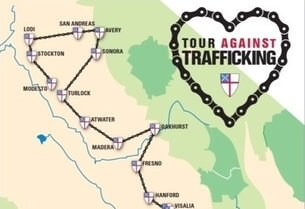Recently Diana Cisneros, 29, of Bakersfield in California’s Central Valley, spent the better part of a day helping a human trafficking victim find safe haven.
“My husband was on his way to church and he saw this young girl running from a hotel with no shoes on; it was a red flag to him,” she told the Episcopal News Service.
“He pulled the car over and talked to her; she turned out to be a victim of human trafficking. We were able to get her help and to get her to a safe place,” said Diana, herself a trafficking survivor.
Shortly after his 2014 election, Bishop David Rice of the Episcopal Diocese of San Joaquin realized that “the Central Valley of California was a thoroughfare and significant vein for human trafficking,” yet few seemed aware of its existence or of the human devastation it leaves in its wake.
Common forms of human trafficking use fraud, force and coercion to trap people into migrant work or sexual situations for profit.
The former New Zealander tackled the issue with, in the language of the indigenous Maori, ahikoi – an intentional physical movement with a purpose, bringing together church and community groups to raise awareness and funds to tackle solutions.
For Bishop David, an avid bicyclist, a bike tour across the diocese seemed like a natural response. Enter the Tour Against Trafficking, an 18-day, 745-mile ride from Taft through the Sierras to Modesto on 2-23 October.
Cyclists of all levels have the option to participate in one or all of the legs of the route, including 26 stops at each of the diocese’s parishes and missions, and to select which of six local anti-trafficking organizations they wish to support.
The documentary film, “The Trafficked Life”, is a cornerstone of the Tour Against Trafficking. It highlights a series of interviews with survivors, including Diana Cisneros.
Filmmaker Michael Fagans said the documentary had been screened across the diocese, along with participation from panels of local activists. “Community by community, we’re seeding the ground so that, when the tour comes, we’re not having to educate people,” Michael told ENS. “Their hearts have already been touched.”
Trafficking, “cuts across all economic strata, across race,” added Michael, who also is joining the tour as a rider. The film and tour have drawn ecumenical as well as “church-broad” support from other dioceses.
Statistics showed that California had three major hotspots for trafficking – San Diego, San Francisco and the Central Valley, Bishop David said.
However, statistics about the prevalence of trafficking typically “are difficult to come by,” said Diana. “We’re talking about an underground criminal organization.” But, it is estimated there are about 300,000 youth in the United States who are minors and at risk for being exploited sexually, she said. As a child, Diana was herself trafficked for sexual exploitation.
“Sexual abuse breaks you down and completely distorts your thinking,” Diana said. “I was very fearful; I didn’t trust people at all.” Through the assistance of friends and local anti-trafficking groups, she fought her way back, and recently earned a bachelor’s degree in psychology.
A member of the steering committee of the Kern Coalition Against Human Trafficking, one of the six groups participating in the Tour Against Trafficking, Diana said her goal was to raise awareness that it “is a very real problem and people can be part of the solution.”
Everyone should be armed with a toll-free trafficking hotline number to offer to someone who appears to need help, she said. It also helps to pay attention to signs that might indicate a trafficking situation.
“Traffickers have a network of people they work with and, if every one of us gets educated, we can be a part of the anti-trafficking network,” she said. “The wider our network is, the more victims we’re going to be able to help.”
Bishop David agreed. “The language I’ve adopted is ‘unawareness equals complicity,’ ” he said. “Our task is to raise awareness of difficulties people face, and … the crimes that are committed and have to be addressed.”
The Global Slavery Index estimates over 35 million people trapped in various forms of modern slavery.
The Anglican Alliance promotes learning across the Anglican Communion on effective responses to human trafficking such as the Tour against Trafficking. Read more on the Alliance website and download “Freedom Sunday” resources promoting a day of worship, prayer and action towards ending human trafficking and modern slavery.

